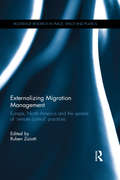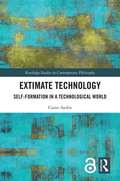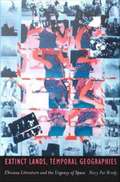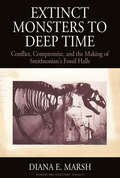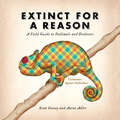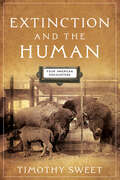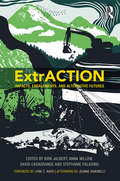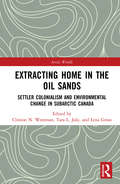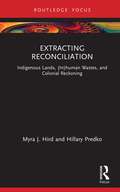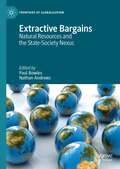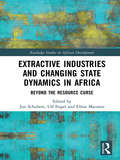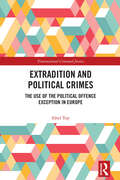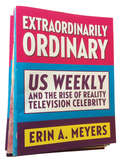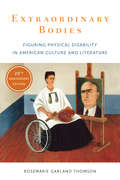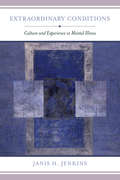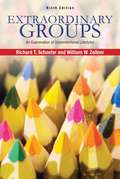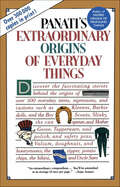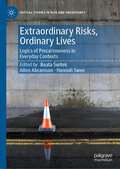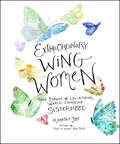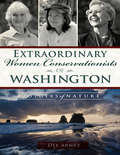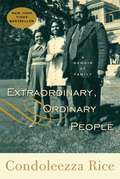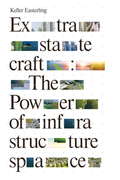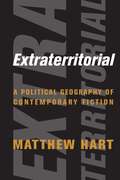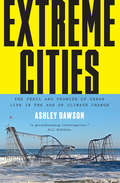- Table View
- List View
Externalizing Migration Management: Europe, North America and the spread of 'remote control' practices (Routledge Research in Place, Space and Politics)
by Ruben ZaiottiThe extension of border controls beyond a country’s territory to regulate the flows of migrants before they arrive has become a popular and highly controversial policy practice. Today, remote control policies are more visible, complex and widespread than ever before, raising various ethical, political and legal issues for the governments promoting them. The book examines the externalization of migration control from an interdisciplinary and comparative perspective, focusing on ‘remote control’ initiatives in Europe and North America, with contributions from the fields of politics, sociology, law, geography, anthropology, and history. This book uses empirically rich analyses and compelling theoretical insights to trace the evolution of ‘remote control’ initiatives and assesses their impact and policy implications. It also explores competing theoretical models that might explain their emergence and diffusion. Individual chapters tackle some of the most puzzling questions underlying remote control policies, such as the reasons why governments adopt these policies and what might be their impact on migrants and other actors involved.
Extimate Technology: Self-Formation in a Technological World (Routledge Studies in Contemporary Philosophy)
by Ciano AydinThis book investigates how we should form ourselves in a world saturated with technologies that are profoundly intruding in the very fabric of our selfhood. New and emerging technologies, such as smart technological environments, imaging technologies and smart drugs, are increasingly shaping who and what we are and influencing who we ought to be. How should we adequately understand, evaluate and appreciate this development? Tackling this question requires going beyond the persistent and stubborn inside-outside dualism and recognizing that what we consider our "inside" self is to a great extent shaped by our "outside" world. Inspired by various philosophers – especially Nietzsche, Peirce and Lacan –this book shows how the values, goals and ideals that humans encounter in their environments not only shape their identities but also enable them to critically relate to their present state. The author argues against understanding technological self-formation in terms of making ourselves better, stronger and smarter. Rather, we should conceive it in terms of technological sublimation, which redefines the very notion of human enhancement. In this respect the author introduces an alternative, more suitable theory, namely Technological Sublimation Theory (TST). Extimate Technology will be of interest to scholars and advanced students working in philosophy of technology, philosophy of the self, phenomenology, pragmatism, and history of philosophy.
Extinct Lands, Temporal Geographies: Chicana Literature and the Urgency of Space
by Mary Pat BradyA train station becomes a police station; lands held sacred by Apaches and Mexicanos are turned into commercial and residential zones; freeway construction hollows out a community; a rancho becomes a retirement community--these are the kinds of spatial transformations that concern Mary Pat Brady in Extinct Lands, Temporal Geographies, a book bringing together Chicana feminism, cultural geography, and literary theory to analyze an unusual mix of Chicana texts through the concept of space. Beginning with nineteenth-century short stories and essays and concluding with contemporary fiction, this book reveals how Chicana literature offers a valuable theoretics of space. The history of the American Southwest in large part entails the transformation of lived, embodied space into zones of police surveillance, warehouse districts, highway interchanges, and shopping malls--a movement that Chicana writers have contested from its inception. Brady examines this long-standing engagement with space, first in the work of early newspaper essayists and fiction writers who opposed Anglo characterizations of Northern Sonora that were highly detrimental to Mexican Americans, and then in the work of authors who explore border crossing. Through the writing of Sandra Cisneros, Cherríe Moraga, Terri de la Peña, Norma Cantú, Monserrat Fontes, Gloria Anzaldúa, and others, Brady shows how categories such as race, gender, and sexuality are spatially enacted and created--and made to appear natural and unyielding. In a spatial critique of the war on drugs, she reveals how scale--the process by which space is divided, organized, and categorized--has become a crucial tool in the management and policing of the narcotics economy.
Extinct Monsters to Deep Time: Conflict, Compromise, and the Making of Smithsonian's Fossil Halls (Museums and Collections #11)
by Diana E. MarshExtinct Monsters to Deep Time is an ethnography that documents the growing friction between the research and outreach functions of the museum in the 21st century. Marsh describes participant observation and historical research at the Smithsonian’s National Museum of Natural History as it prepared for its largest-ever exhibit renovation, Deep Time. As a museum ethnography, the book provides a grounded perspective on the inner-workings of the world’s largest natural history museum and the social processes of communicating science to the public.
Extinct for a Reason
by Aaron Adler Scott CooneyBefore there was Darwin, before there was man's best friend, there were . . . Failimals. The Royal Failimal Society presents the Unchameleon, Bipolar Bear, Emo Emu, and other Darwin-defiant animals that, though fascinating, have clearly become extinct for a reason. The culmination of years of research, study, and observation across each continent and every era, Extinct for a Reason is the definitive field guide to the hows, whys, and whats of Failimals and Evolosers. With colorful illustrations and vital information on everything from mating habits to defense mechanisms, this book is a must-have for any species considering undergoing the evolutionary process. Learn how to avoid common mistakes, such as: Alienating oneself from one's peers (see: Goth Sloth) Refusing to admit one's genes are improperly sized (see: Muffintopotamus) Having dangerously high levels of charisma (see: Elvisaurus) Weeded out but still proud, the curious creatures collected within serve as a warning to ambitious animals everywhere: Evolve with Caution.
Extinction and the Human: Four American Encounters (Alembics: Penn Studies in Literature and Science)
by Timothy SweetThe Americas have been the site of two distinct waves of human migration, each associated with human-caused extinctions. The first occurred during the late Pleistocene era, some ten to thirty thousand years ago; the other began during the time of European settler-colonization and continues to this day.In Extinction and the Human Timothy Sweet ponders the realities of animal extinction and endangerment and the often divergent Native American and Euro-American narratives that surround them. He focuses especially on the force of human impact on megafauna—mammoths, whales, and the North American bison—beginning with the moments that these species' extinction or endangerment began to generate significant print archives: transcriptions of traditional Indigenous oral narratives, historical and scientific accounts, and literary narratives by Indigenous American and Euro-American authors. "If the Sixth Extinction is a hyperobject, an event so massively distributed in space and time that it cannot be experienced directly," he writes, "these cases of particular megafauna have nevertheless consistently commanded our focus and attention. They form a starting point for a coherent, approachable history."Reflecting on questions of agency, responsibility, and moral assessment, Sweet engages with the consequences of thinking of humans as fundamentally separate from the rest of the natural world. He investigates stories of a lost race of giants at the time of the first encounters between Europeans and Indigenous Americans; culturally distinct ways of understanding the extinction of the mammoths; the impact of the Euro-American whaling industry and the controversial revitalization of Native American whaling traditions; and the bison's near-extermination at the hands of white market hunters and today's Euro-American and Native American efforts on behalf of the animal's preservation. He reflects on humans' relations with animals through models of divine preservation, competitive extermination, evolutionary determination, biophilia, and treaties with animals. Ultimately, he argues, it is the critical assessment of ideas of human exceptionalism that provides a necessary counterpoint both to apologies for human mastery over nature and deep ecology's attempts to erase the human.
ExtrACTION: Impacts, Engagements, and Alternative Futures
by Anna Willow David Casagrande Kirk Jalbert Stephanie PaladinoThis timely volume examines resistance to natural resource extraction from a critical ethnographic perspective. Using a range of case studies from North, Central and South America, Australia, and Central Asia, the contributors explore how and why resistance movements seek to change extraction policies, evaluating their similarities, differences, successes and failures. A range of ongoing debates concerning environmental justice, risk and disaster, sacrifice zones, and the economic cycles of boom and bust are considered, and the roles of governments, free markets and civil society groups re-examined. Incorporating contributions from authors in the fields of anthropology, public policy, environmental health, and community-based advocacy, ExtrACTION offers a robustly argued case for change. It will make engaging reading for academics and students in the fields of critical anthropology, public policy, and politics, as well as activists and other interested citizens.
Extracting Home in the Oil Sands: Settler Colonialism and Environmental Change in Subarctic Canada (Arctic Worlds)
by Clinton N. Westman Tara L. Joly Lena GrossThe Canadian oil sands are one of the world’s most important energy sources and the subject of global attention in relation to climate change and pollution. This volume engages ethnographically with key issues concerning the oil sands by working from anthropological literature and beyond to explore how people struggle to make and hold on to diverse senses of home in the region. The contributors draw on diverse fieldwork experiences with communities in Alberta that are affected by the oil sands industry. Through a series of case studies, they illuminate the complexities inherent in the entanglements of race, class, Indigeneity, gender, and ontological concerns in a regional context characterized by extreme extraction. The chapters are unified in a common concern for ethnographically theorizing settler colonialism, sentient landscapes, and multispecies relations within a critical political ecology framework and by the prominent role that extractive industries play in shaping new relations between Indigenous Peoples, the state, newcomers, corporations, plants, animals, and the land.
Extracting Reconciliation: Indigenous Lands, (In)human Wastes, and Colonial Reckoning (More Than Human Humanities)
by Myra J. Hird Hillary PredkoExtracting Reconciliation argues that reconciliation constitutes a critical contemporary mechanism through which colonialism is seeking to ensure continuing access to Indigenous lands and resources. Making use of two historical case studies concerned with the intersection of resource extraction, Crown/Inuit relations, and waste legacies in Nunavut, Canada, the authors illuminate the mechanisms of colonial and neoliberal governance globally that promise reconciliation while delivering the status quo. Through Indigenous and non-Indigenous anticolonial and posthuman concepts and theories, the book engages with the inhuman politics of settler colonial extractivism and explores the socio-ethical social justice dimensions, political possibilities, and environmental implications of a much more challenging and accountable reckoning between (settler) colonialism and Indigenous land rights. This book is of interest to students and scholars in gender studies, postcolonial studies, environmental studies, Indigenous studies, and politics.
Extractive Bargains: Natural Resources and the State-Society Nexus (Frontiers of Globalization)
by Paul Bowles Nathan AndrewsThis book is the first to focus on state-led ‘extractive bargains,’ designed to reach a social consensus on the extent of extractive activities, how they should be governed and their negative consequences mitigated. These state-led ‘bargains’ have taken a number of different forms and offer varying degrees of promise in meeting environmental and social concerns. The book critically examines ‘bargains’ in states across the Global North and the Global South, incorporates Indigenous issues, and judiciously assesses their prospects for promoting long-term sustainability. It focusses on mineral and fossil fuel extraction in particular including bargains designed to govern the former as the demand for minerals used in “green energy” increases and to limit the use of the latter.The book will be of interest to students and researchers of global studies, global political economy, political science, political sociology, sustainability, environmental sociology, development studies and geography. Chapter 1 is available open access under a Creative Commons Attribution 4.0 International License via link.springer.com.
Extractive Industries and Changing State Dynamics in Africa: Beyond the Resource Curse (Routledge Studies in African Development)
by Jon Schubert Ulf Engel Elísio MacamoThis book uses extractive industry projects in Africa to explore how political authority and the nation-state are reconfigured at the intersection of national political contestations and global, transnational capital. Instead of focusing on technological zones and the new social assemblages at the actual sites of construction or mineral extraction, the authors use extractive industry projects as a topical lens to investigate contemporary processes of state-making at the state–corporation nexus. Throughout the book, the authors seek to understand how public political actors and private actors of liberal capitalism negotiate and redefine notions and practices of sovereignty by setting legal, regulatory and fiscal standards. Rather than looking at resource governance from a normative perspective, the authors look at how these negotiations are shaped by and reshape the self-conception of various national and transnational actors, and how these jointly redefine the role of the state in managing these processes for the ‘greater good’. Extractive Industries and Changing State Dynamics in Africa will be useful for researchers, upper-level students and policy-makers who are interested in new articulations of state-making and politics in Africa.
Extradition and Political Crimes: The Use of the Political Offence Exception in Europe (Transnational Criminal Justice)
by Sibel TopThis book examines the evolution and current application of the political offence exception clause to extradition in Europe.The long-standing academic exploration of terrorism has recently given way to renewed interest in the political offence exception to extradition, prompted by recent events that signal a democratic downturn globally. Despite the significant curtailment – and, in some cases, the complete abolition – of the political offence exception to extradition in Europe, certain European states continue to quietly implement this exception to deny extradition requests. This work studies the development of the political offence exception in Europe by narrowing its focus from an international perspective to the European context, specifically examining the Council of Europe and the European Union, before zeroing in on the Catalan independence crisis, which offers a particularly valuable case for analysing the application of the political offence exception in the European context.By providing a detailed examination of the evolving protections for political offenders within European legal frameworks, the text updates the long overdue academic knowledge on the matter. It is therefore an essential resource for anyone interested in European criminal law and extradition, in particular. It will also be of interest to researchers, academics, and policy-makers working in the areas of criminal law, human rights law, legal theory, criminology, and political science.
Extraordinarily Ordinary: Us Weekly and the Rise of Reality Television Celebrity
by Erin A. MeyersExtraordinarily Ordinary offers a critical analysis of the production of a distinct form of twenty-first century celebrity constructed through the exploding coverage of reality television cast members in Us Weekly magazine. Erin A. Meyers connects the economic and industrial forces that helped propel Us Weekly to the top of the celebrity gossip market in the early 2000s with the ways in which reality television cast members fit neatly into the social and cultural norms that shaped the successful gossip formulas of the magazine. Us Weekly’s construction of the “extraordinarily ordinary” celebrity within its gossip narratives is a significant symptom of the broader intensification of discourses of ordinariness and the private in the production of contemporary celebrity, in which fame is paradoxically grounded in “just being yourself” while simultaneously defining what the “right” sort of self is in contemporary culture.
Extraordinary Bodies: Figuring Physical Disability in American Culture and Literature
by Rosemarie Garland ThomsonExtraordinary Bodies is a cornerstone text of disability studies, establishing the field upon its publication in 1997. Framing disability as a minority discourse rather than a medical one, the book added depth to oppressive narratives and revealed novel, liberatory ones. Through her incisive readings of such texts as Harriet Beecher Stowe's Uncle Tom's Cabin and Rebecca Harding Davis's Life in the Iron Mills, Rosemarie Garland-Thomson exposed the social forces driving representations of disability. She encouraged new ways of looking at texts and their depiction of the body and stretched the limits of what counted as a text, considering freak shows and other pop culture artifacts as reflections of community rites and fears. Garland-Thomson also elevated the status of African-American novels by Toni Morrison and Audre Lorde. Extraordinary Bodies laid the groundwork for an appreciation of disability culture and an inclusive new approach to the study of social marginalization.
Extraordinary Conditions
by Janis H. JenkinsWith a fine-tuned ethnographic sensibility, Janis H. Jenkins explores the lived experience of psychosis, trauma, and depression among people of diverse cultural orientations, revealing how mental illness engages fundamental human processes of self, desire, gender, identity, attachment, and interpretation. Extraordinary Conditions illuminates the cultural shaping of extreme psychological suffering and the social rendering of the mentally ill as nonhuman or not fully human. Jenkins contends that mental illness is better characterized in terms of struggle than symptoms and that culture is central to all aspects of mental illness from onset to recovery. Her analysis refashions the boundaries between the ordinary and the extraordinary, the routine and the extreme, and the healthy and the pathological. This book asserts that the study of mental illness is indispensable to the anthropological understanding of culture and experience, and reciprocally that understanding culture and experience is critical to the study of mental illness.
Extraordinary Groups: An Examination of Unconventional Lifestyles (Ninth Edition)
by Richard T. Schaefer William W. ZellnerNow in its ninth edition, Extraordinary Groups has had a most gratifying history. Written by sociologists, using and illustrating sociological principles, the book has also been adopted in various other social science courses, including anthropology, religion, history, and psychology. This interdisciplinary approach is one reason the book has been used in hundreds of colleges and universities, a number that continues to grow.
Extraordinary Origins of Everyday Things
by Charles PanatiAstonishing stories behind 500 everyday items, expressions, and customs—from Kleenex to steak sauce, Barbie Dolls to honeymoons.For lovers of facts, students of popular culture, history buffs, and science enthusiasts, the foremost specialist on everything tells us how and why hundreds of the everyday items, expressions, and customs we take for granted came into existence. Learn the fascinating discovery stories behind over 500 phenomena, including:How chewing gum and Silly Putty began as substitutes for rubberHow the potato chip emerged from an act of pique on the part of a Native American named CrumWhy April Fool’s Day started out as New Year’s Eve, a joke in itselfHow the song “Happy Birthday to You” began as a kindergarten jingle titled “Good Morning to All”How the zipper was one man’s attempt to make obsolete not buttons . . . but shoelacesHow the newlywed husband came to the aid of his accident-prone bride with the invention of the Band-AidHow the hotdog began as an outlawed Roman sausage and received its name at a New York baseball gameHow Drs. Fallopius and Condom made strides in inventing and popularizing a male means of birth controlHow the original Goldilocks was a disgruntled, gray-haired crone, tortured by the three bearsHow Ketchup came from the Romans, Tabasco sauce from an exiled New Orleans banker, Mayonnaise from a French duke, and A.1. Steak Sauce from a royal chef named Brand And many, many more in this carefully organized, delicious compendium of little-known facts—guaranteed to amaze, absorb, amuse, and delight.
Extraordinary Risks, Ordinary Lives: Logics of Precariousness in Everyday Contexts (Critical Studies in Risk and Uncertainty)
by Allen Abramson Beata Świtek Hannah SweeThis book untangles the relationship between expert categorisations of risk and the on-the-ground experiences of untrained ‘ordinary’ people who may be routinely subjected to significant danger in a variety of extraordinary contexts. It considers political, ethical and moral dimensions of risk and calls for more targeted ethnographic research, designed to reveal how grass-roots risk dispositions and practice intersect with official discourses, individual agency and community resilience.
Extraordinary Wing Women: True Stories of Life-Altering, World-Changing Sisterhood
by Kimothy JoyA beautifully illustrated gift book celebrating the beauty, power, and joy of female friendship. Wingman: a pilot who flies behind and outside the leader of a flying formation.While researching her first book, That’s What She Said, Kimothy Joy discovered that the famous women she was profiling were not alone in their success. Each of them were propelled forward by a supporter—a wing woman—a sister, a mom, a best friend, a close confidant. The remarkable partnerships they shared were as multifaceted and complex as the individual women themselves. Extraordinary Wing Women is Joy’s tribute to the importance of female camaraderie. This collection features 33 stories, each varying in length, accompanied by watercolor portraits, illustrations, and hand-lettered quotes. Some will be familiar power duos—Oprah and Gayle, Helen Keller and Anne Sullivan, Venus and Serena Williams. Others are less known though just as inspiring such as the friendship of Julia Child and her editor Avis DeVoto, Junko Tabei and her all-women mountaineering team, and the Mariposas—the Mirabel sisters who overthrew a dictator in the Dominican Republic. The women featured are from across the world and from diverse periods of history. They are activists, artists, scientists, politicians, athletes, musicians, writers, and more—role models for every woman.Joy dedicates Extraordinary Wing Women to the generations of women who are dismantling the myth that we must compete with one another to pursue and achieve our dreams. History and fiction have shown that we are stronger when we support one another. Joy hopes to inspire and teach us that we, too, have our own wings and can soar higher than ever before with our wing women beside us.The book includes a blank spread at the end which readers can use to honor the Extraordinary Wing Woman in their own lives by writing or drawing their own tribute story.
Extraordinary Women Conservationists of Washington: Mothers of Nature
by Dee ArntzCourageous women are to thank for many of Washington's environmental conservation successes. Bonnie Phillips, Melanie Rowland and Helen Engle battled harmful timber cutting. Polly Dyer and Emily Haig worked to expand Olympic National Park and organized efforts to establish North Cascades National Park. Women helped create the Washington Environmental Council and Washington Conservation Voters. As a state representative, Jolene Unsoeld led the fight against Boeing and other major corporations to pass the state Model Toxics Control Act. Author and Washington conservationist Dee Arntz recounts these important stories and many others, showing that the legacy of Washington's female conservationists is nothing short of extraordinary.
Extraordinary, Ordinary People: A Memoir Of Family
by Condoleezza RiceCondoleezza Rice has excelled as a diplomat, political scientist, and concert pianist. Her achievements run the gamut from helping to oversee the collapse of communism in Europe and the decline of the Soviet Union, to working to protect the country in the aftermath of 9-11, to becoming only the second woman - and the first black woman ever -- to serve as Secretary of State. But until she was 25 she never learned to swim. Not because she wouldn't have loved to, but because when she was a little girl in Birmingham, Alabama, Commissioner of Public Safety Bull Connor decided he'd rather shut down the city's pools than give black citizens access. Throughout the 1950's, Birmingham's black middle class largely succeeded in insulating their children from the most corrosive effects of racism, providing multiple support systems to ensure the next generation would live better than the last. But by 1963, when Rice was applying herself to her fourth grader's lessons, the situation had grown intolerable. Birmingham was an environment where blacks were expected to keep their head down and do what they were told -- or face violent consequences. That spring two bombs exploded in Rice's neighborhood amid a series of chilling Klu Klux Klan attacks. Months later, four young girls lost their lives in a particularly vicious bombing. So how was Rice able to achieve what she ultimately did? Her father, John, a minister and educator, instilled a love of sports and politics. Her mother, a teacher, developed Condoleezza's passion for piano and exposed her to the fine arts. From both, Rice learned the value of faith in the face of hardship and the importance of giving back to the community. Her parent's fierce unwillingness to set limits propelled her to the venerable halls of Stanford University, where she quickly rose through the ranks to become the university's second-in-command. An expert in Soviet and Eastern European Affairs, she played a leading role in U. S. policy as the Iron Curtain fell and the Soviet Union disintegrated. Less than a decade later, at the apex of the hotly contested 2000 presidential election, she received the exciting news just shortly before her father's death that she would go on to the White House as the first female National Security Advisor. As comfortable describing lighthearted family moments as she is recalling the poignancy of her mother's cancer battle and the heady challenge of going toe-to-toe with Soviet leaders, Rice holds nothing back in this remarkably candid telling. This is the story of Condoleezza Rice that has never been told, not that of an ultra-accomplished world leader, but of a little girl and a young woman -- trying to find her place in a sometimes hostile world and of two exceptional parents, and an extended family and community, that made all the difference.
Extrastatecraft
by Keller EasterlingExtrastatecraft controls everyday life in the city: it's the key to power - and resistance - in the twenty-first century. Infrastructure is not only the underground pipes and cables controlling our cities. It also determines the hidden rules that structure the spaces all around us - free trade zones, smart cities, suburbs, and shopping malls. Extrastatecraft charts the emergent new powers controlling this space and shows how they extend beyond the reach of government. Keller Easterling explores areas of infrastructure with the greatest impact on our world - examining everything from standards for the thinness of credit cards to the urbanism of mobile telephony, the world's largest shared platform, to the "free zone," the most virulent new world city paradigm. In conclusion, she proposes some unexpected techniques for resisting power in the modern world. Extrastatecraft will change the way we think about urban spaces - and how we live in them.From the Hardcover edition.
Extraterritorial: A Political Geography of Contemporary Fiction
by Matthew HartThe future of fiction is neither global nor national. Instead, Matthew Hart argues, it is trending extraterritorial. Extraterritorial spaces fall outside of national borders but enhance state power. They cut across geography and history but do not point the way to a borderless new world. They range from the United Nations headquarters and international waters to CIA black sites and the departure zones at international airports. The political geography of the present, Hart shows, has come to resemble a patchwork of such spaces.Hart reveals extraterritoriality’s centrality to twenty-first-century art and fiction. He shows how extraterritorial fictions expose the way states construct “global” space in their own interests. Extraterritorial novels teach us not to mistake cracks or gradations in political geography for a crisis of the state. Hart demonstrates how the unstable character of many twenty-first-century aesthetic forms can be traced to the increasingly extraterritorial nature of contemporary political geography. Discussing writers such as Margaret Atwood, J. G. Ballard, Amitav Ghosh, Chang-rae Lee, Hilary Mantel, and China Miéville, as well as artists like Hito Steyerl and Mark Wallinger, Hart combines lively critical readings of contemporary novels with historical and theoretical discussions about sovereignty, globalization, cosmopolitanism, and postcolonialism. Extraterritorial presents a new theory of literature that explains what happens when dreams of an open, connected world confront the reality of mobile, elastic, and tenacious borders.
Extratraños Cuentos Del Mar
by Jack Strange Roberto Peña Páez¿Qué se esconde debajo de las olas y a bordo de los barcos más misteriosos? Prepárese para experimentar toda la tradición y el atractivo del mar con estos mitos, leyendas e historias reales. El Folclore de siglos de antigüedad y cuentos sobre embarcaciones embrujadas, monstruos marinos, fantasmas, canibalismo en el mar y misteriosas desapariciones. Además también se incluyen historias de marineros en tierra, prostitutas, engarzados que fueron atacaron. Averigüe qué sucedió con los polizones, cómo fueron tratados y sobre el mito de que las mujeres no eran bienvenidas en los barcos. Bienvenido a Strange Tales of the Sea.
Extreme Cities: The Peril and Promise of Urban Life in the Age of Climate Change
by Ashley DawsonA cutting exploration of how cities drive climate change while being on the frontlines of the coming climate crisisHow will climate change affect our lives? Where will its impacts be most deeply felt? Are we doing enough to protect ourselves from the coming chaos? In Extreme Cities, Ashley Dawson argues that cities are ground zero for climate change, contributing the lion’s share of carbon to the atmosphere, while also lying on the frontlines of rising sea levels. Today, the majority of the world’s megacities are located in coastal zones, yet few of them are adequately prepared for the floods that will increasingly menace their shores. Instead, most continue to develop luxury waterfront condos for the elite and industrial facilities for corporations. These not only intensify carbon emissions, but also place coastal residents at greater risk when water levels rise.In Extreme Cities, Dawson offers an alarming portrait of the future of our cities, describing the efforts of Staten Island, New York, and Shishmareff, Alaska residents to relocate; Holland’s models for defending against the seas; and the development of New York City before and after Hurricane Sandy. Our best hope lies not with fortified sea walls, he argues. Rather, it lies with urban movements already fighting to remake our cities in a more just and equitable way.As much a harrowing study as a call to arms Extreme Cities is a necessary read for anyone concerned with the threat of global warming, and of the cities of the world.
